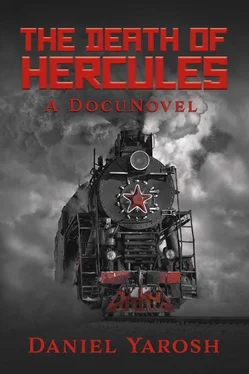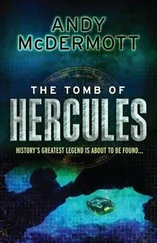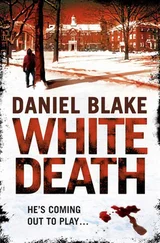The guerilla war efforts by Marusya, Kotovsky and their allied Bolshevik brigades in March and April 1919 inflicted heavy losses on Semesenko’s troops and resources. Semesenko further enraged locals by conscripting their sons into the Cossack army to replace his growing number of deserters.
Kotovsky’s group gradually moved south, but Max was never quite sure of its location and had no local knowledge of the terrain or the distances to nearby main towns. The patrols employed hit and run tactics of the Black Guard, who kept Max busy maintaining the armored trucks. With the constant movement, all the men were on high alert and he was without an opportunity to escape.
On Friday, April 25, Marusya led a raid on a local Cossack garrison that had occupied the baroque Sanguszko Palace estate in Antoniny. They returned to camp with petrol, provisions and two Cossack captives stuffed into the back of an armored truck as human shields. Marusya wanted to hold them for ransom, but Sholom insisted on leading their interrogation first. Rather than taking them to the administrative tent, they took the bound hostages through the motor pool, summoned Max, and continued to the edge of camp. There Sholom had the two men kneel, hands bound behind their backs. Max held his hands palms up, questioning why he should be there, but Marusya gestured with her pistol that he should stand ten feet in front of them while she and Sholom stood behind.
Sholom questioned the first hostage about the commanders of his garrison, and other local stations. The man, shaking with fear, answered between sobs. Sholom then asked him about the defenses in Proskuriv. He replied that he had only been there once and was back before dinner. From the back-and-forth Max made the calculation that he was only about 50 or 60 kilometers north of the town. That put their camp another 10 kilometers closer.
Sholom paused for a long while after one question, raised his pistol and shot the hostage in the back of the head, spraying his face on the ground at Max’s feet. The second hostage cried out. Marusya spoke in low whispers to Sholom, asking him to stop so that they could ransom the second man. Sholom answered in barking whispers that he had more questions. He then stood silently for several minutes, which intensified the terror for the second bound soldier.
Finally, Sholom asked him “What is your name?”
“Alexander Karetnik,” he replied.
“Where does your wife live?”
The man, shaking uncontrollably, replied quietly “I have no wife.”
“No wife? No wife? Neither do I.” He paused. “Where does your mother live?”
“My mother?”
“Yes, your mother. Where does she live?” Sholom asked.
Marusya whispered to Sholom, “I know, I know. But not now, Sholom.”
Sholom ignored her and barked “Where does she live?”
The man whimpered “My mother? Why my mother?”
“I want to visit her and tell her about her son.”
“Why?”
“Where does your mother live?” Sholom barked again.
The man sobbed “Teofipol.”
“Teofipol. Good,” Sholom said. He raised his pistol and shot Alexander Karetnik in the back of the head.
Sholom remained frozen in the firing position. Marusya hung her head, then looked up at Max. She said “This is how we handle enemies and deserters, Max. Make no mistakes.”
**********
By May 1919 Simon Petliura of the Ukrainian People’s Republic Directorate and their military commanders had lost patience with the lack of progress by the Cossacks and Ivan Semesenko, who still had not recovered from his bout with gonorrhea. The vicious pogroms had cost the Ukrainian State sympathy from outraged Europeans who were funding the resistance to the Anarchists and Bolsheviks. Petliura saw a political solution to his military problems. He blamed Semesenko and his Cossacks for instigating the Proskuriv pogroms and had him arrested and imprisoned in the Ukrainian Army garrison at Kamianets-Podilskyi, southwest of Proskuriv. The Army then took over control of Proskuriv and absorbed the Cossacks regiments into their ranks. This began a Spring offensive by the military and political propogandists to eliminate the leftist radical militias from southern Ukraine.
In the late afternoon of Wednesday, June 10, a reconnaissance patrol of two motorcycles and an armored car returned to Max’s camp motor pool. Rather than scatter back to their tents to prepare for dinner, the men retrieved a package from the car trunk and hovered around it. The box was made from thin wood, painted white, and tied with a ribbon decorated in traditional Ukrainian colors of red roses and black lined diamonds. The soldiers recognized it as a typical lunch box a wife would pack for her husband before a trip. Their leader pulled on the ribbon and opened the box.
Inside was not homemade morsels but a small stack of papers. On the top was a notice printed in large type announcing that the allies of the Ukraine were offering free food in Odessa for all Ukrainian soldiers and their families who would reunite with their Motherland. The food distribution was organized by none other than the United States, under the direction of the famous humanitarian Mr. Herbert Hoover.
The papers underneath it were not from the Ukrainian government but from the Bolshevik command in Kharkiv. It announced that the Red Army had consolidated in their Kharkiv Prison the bourgeoise hostages it had collected during the winter. These wealthy kulaks and peasants were available for release by a ransom payment at the prison. The pages following it contained several hundred names in small print. The soldiers poured over the list looking for people they knew, or just people they had heard about. They passed the pages about, shouting names in surprise and shock.
Then one soldier called out to Max, “Hey Max, are you Shertok?”
“Yes,” Max said, hesitantly.
“From Kherson?”
“Yes?” Max mumbled, rushing over to the soldier and his page. He pointed his finger to a line in the long list, and Max squinted. There clearly printed was “Shneer-Solomon Shertok and Ethel Shertok, Kherson. Five thousand rubles.” Max collapsed to the ground on his knees. He now knew exactly where his Mamma and Pa were, and they could not be in a more unreachable place – in a Bolshevik prison. He was overwhelmed with anger, frustration and then desperation at his desolate circumstances. For the first time since he left his brothers, he cried.
The reconnaissance patrol leader finally repacked the box and went off to report to the senior staff that they had returned and to show them the papers. Their propaganda intent was clear: tempt the militia, who might be hungry, with food, and display to them the ruthless cruelty of their Bolshevik allies to their own people. Kotovsky and Marusya were surprised by this new level of psychological warfare, but Marusya probed more. Where had they found the box? At what intersection? Who could see it from the road?
Marusya then pulled Kotovsky over to the side of the staff group. Not only was this a propaganda ploy, she told him, but a counterintelligence trick. The Ukrainian Army had no doubt planted many similar boxes around the territory, like lobster traps. All they had to do was return to each site to see which of the lures was taken. That would greatly narrow their search for Kotovsky’s camp. They must leave at once.
Max was in his tent, deeply brooding his helplessness, and mourning over his parents, who, if they were still alive, must be filled with fear, dread and a sense of abandonment. It took a few moments for the commotion of the camp to pull his consciousness to the present. But then he immediately knew what all the activity meant. They were breaking camp to move. Now they were going to take from him one more invaluable thing – the knowledge of where he was in the world. He scrambled to gather his few possessions and tie them in his bed cover. He poked his head out of the tent.
Читать дальше












